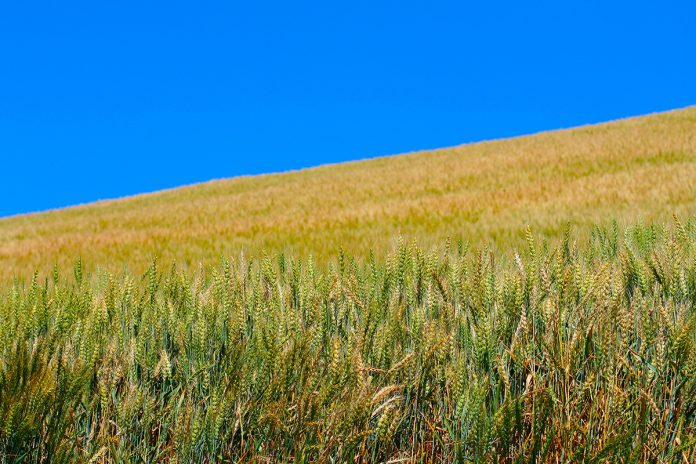The effects of climate change threaten food security worldwide. What needs to be done to improve the resilience of vital dryland cereals to more extreme weather?
Climate change, including warming, changes in precipitation patterns, and increases in extreme events, is continuing and accelerating, validating the model-based projections of climate scientists and the Intergovernmental Panel on Climate Change.
These changes threaten global food security through expected adverse effects on agriculture. Rain-fed cereals in semi-arid regions of the world are particularly vulnerable because often they are already functioning at the limits of sustainability set by annual precipitation and temperature regimes. Historical rates of increase in the yields of these commodities have already slowed in lower latitudes, with immediate implications for human well-being. Effects in higher latitudes may be delayed due to baseline conditions and the fertilising effect of elevated atmospheric CO2 concentration, but eventually, these systems also will be at risk.
Building resilience of dryland cereals to the challenge of climate change must address entire cropping systems and their interdependent components. These components include crop varieties, methods of cultivation, nutrient management, rotational practices, pest, weed and disease management, crop harvesting, storage and transport.
Genetic improvement of the crops for yield, heat tolerance and water use efficiency must be accompanied by and compatible with improvements in all components of the cropping system. These improvements, include diversifying crops grown to reduce vulnerability associated with continuous cropping, preserving soil carbon, conserving soil moisture, protecting soil health and coping with climate-driven changes in pest, diseases and weeds.
For example, although water scarcity can be addressed by prudently implementing fallow periods, tillage and residue management, novel crop rotations and drought-resilient crop varieties, these will necessitate concomitant optimisation of nutrient, pest, weed and pathogen management. There is, therefore, an urgent need for coordinated efforts by scientists in many disciplines to address whole systems rather than isolated elements.
Further, although the technical advances needed seem achievable, they must be implemented in different social, economic and regulatory contexts. Success will require working closely with farmers and other stakeholders for innovation that can complement the science to ensure new approaches are adopted and supported effectively.
One of the most challenging effects of climate change on cereal systems will be those influencing pests, weeds and diseases. Crop protection is already difficult in most cereal systems and climate change is certain to complicate it. This is because climate change can cause some pests, weeds and diseases to increase in severity while others may decrease.
Although models project that insect pest pressure in wheat, rice and soybean will uniformly increase with global warming, these have been developed with a focus on insect physiology and population dynamics.
Also important are shifts in pest geographic ranges, climate-driven changes in crop phenology or grower practices, and the effects of climate on natural enemies that provide biological control of pests. Indeed, likely due to these complexities, among the 12 species of wheat pests that have been studied for documented or anticipated responses to climate change, responses are mixed.
Variability in response to climate change is also likely for pathogens and weeds. Thus, against a general theoretical expectation of potential increases in pest, disease and weed pressure with climate change, specific studies are needed to delineate actual effects for individual species and systems and the prudent responses.
As another illustration of the complexity of agricultural system responses to climate change, crop production itself contributes to climate change. Agriculture is responsible for approximately 11% of total greenhouse gas emissions worldwide, with 65% of this due to nitrous oxide emissions from agricultural soils, which could be reduced through improved agricultural practices.
To address these complexities, coordinated efforts are needed that can support scientists and stakeholders in transdisciplinary efforts that consider entire production systems.
One such effort was the recently completed project, Regional Approaches to Climate Change for Pacific Northwest Agriculture (REACCH). The seven-year project, launched in 2011, involved a team of more than 100 faculty members, scientists, graduate students and others from the University of Idaho, Washington State University, Oregon State University and the USDA’s Agricultural Research Service.
Participants represented the core agricultural disciplines, climate science, geography, sociology, economics, education and information sciences. The effort integrated research, education and extension. The outputs and impacts of REACCH can be viewed through the project website. Highlights include more than 100 scientific articles on aspects of these systems, a Special Research Topic in Frontiers, Building Resilience to Climate Change in Cereal Production Systems: Agroecosystem Components and Integrative Approaches, projections concerning wheat yields in the region under climate change and online tools for stakeholders to access these, surveys of producer attitudes and practices relating to sustainable wheat production, and a 640-page handbook for producers summarising information to help them succeed.
To share their findings with specialists working on cereal systems globally, the REACCH team also organised a conference, entitled Transitioning Cereal Systems to Adapt to Climate Change (TCSACC).
Experts from 17 countries attended the conference, with backgrounds as diverse as those within REACCH, shared insights and priorities for efforts going forward. One indirect outcome of this was the establishment of an Expert Working Group in Wheat Agronomy within the international Wheat Initiative, with an emphasis on the interdisciplinary integration highlighted through the TCSACC.
As summarised in a published synopsis of TCSACC, which also reflects the effort of REACCH, researchers around the world must:
- Establish coordinated, large-scale, transdisciplinary efforts that are based on integration among knowledge communities.
- Strengthen the comprehensiveness of cropping systems models.
- Consider the global context of production systems by nurturing networks connecting these large-scale efforts. Achieving this will require continued support from national and international funding agencies.
The challenges expected from climate change across many sectors are numerous and some are already evident. Compounding these with decreased food security must be avoided.
Please note: this is a commercial profile
Sanford D Eigenbrode
Professor
Department of Entomology, Plant Pathology & Nematology
Tel: +1 208 885 2972
www.uidaho.edu/cals/entomology-plant-pathology-and-nematology/our-people/sanford-eigenbrode











